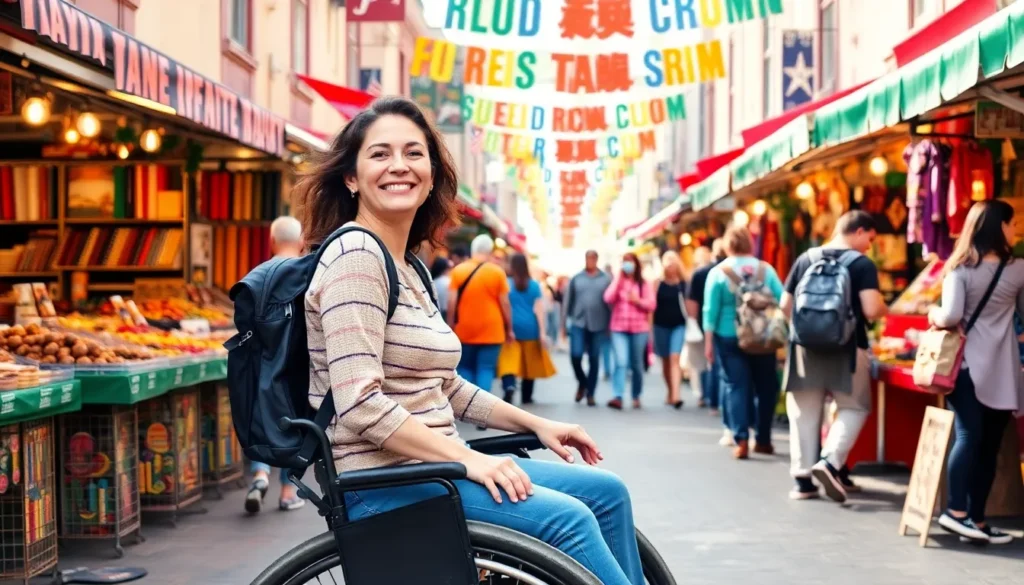Traveling should be a joy for everyone, but it often feels like a game of “find the hidden accessibility features.” Fear not, intrepid wanderers! With the right inclusive travel tips, exploring the world can be as easy as finding Wi-Fi in a coffee shop. Whether you’re rolling in a wheelchair or strolling with a cane, there’s no reason to miss out on the adventure.
Table of Contents
ToggleUnderstanding Inclusive Travel
Inclusive travel prioritizes accessibility for all individuals, ensuring they can enjoy their adventures without obstacles. This concept encompasses various factors including infrastructure, transportation, and accommodations. Many travel providers now recognize the importance of offering accessible options.
Individuals with mobility aids, such as wheelchairs and canes, often face unique challenges. Travel facilities must meet specific standards to enhance accessibility. Moreover, communication plays a crucial role in creating an inclusive environment. Signage, assistance offerings, and trained personnel support travelers with diverse needs effectively.
Hotels with wheelchair-accessible rooms provide necessary comfort and convenience. Restaurants should feature menus in braille and have friendly staff trained to accommodate individuals with disabilities. Additionally, tour operators can offer tailored experiences, ensuring all customers receive equitable attention and assistance.
Travel-related technology has also advanced significantly, introducing apps that highlight accessible routes and services in various locations. Websites can now feature filters for accessibility options, making it easier for travelers to find suitable accommodations and activities.
Before a trip, conducting thorough research is invaluable. Many resources are available for travelers with disabilities, ensuring they find reliable information on accessibility. Choices may include reading reviews or contacting establishments directly.
Implementing these strategies enhances the travel experiences of all individuals. By focusing on inclusive travel, highlighting barriers, and seeking solutions, the vacation experience becomes enriching for everyone involved.
Planning Your Trip

Planning an inclusive trip requires attention to detail and a focus on accessibility needs. Making informed choices enables enjoyable experiences for everyone.
Researching Destinations
Identify destinations that prioritize accessibility. Search for information on local attractions, public transportation, and walkability. Check online reviews and accessibility reports to gauge the experiences of previous travelers. Look for cities renowned for their inclusive practices, such as San Francisco or Amsterdam. Visit websites that specialize in accessible travel to find insights and recommendations tailored to different needs. Collectively, these resources enable travelers to make educated decisions and enhance overall experiences.
Accessible Accommodations
Choose accommodations that cater specifically to accessibility requirements. Book hotels with documented wheelchair access, roll-in showers, and adjustable features. Verify that rooms offer ample space for mobility devices. Inquire about provisions such as braille signage and auditory alarms. Many hotel chains actively promote their commitment to accessibility, allowing travelers to make informed selections. Evaluate online booking platforms that filter results based on accessibility options, ensuring a smooth booking process. The right accommodations significantly improve trip enjoyment and comfort.
Transportation Options
Inclusive travel requires careful consideration of transportation methods. Recognizing the unique needs of travelers with mobility aids ensures a smoother experience.
Air Travel Considerations
Air travel presents various challenges that require planning. Airlines should be notified in advance about specific needs, such as wheelchair assistance. Accessible check-in counters and priority boarding significantly enhance the travel experience. Travelers should also verify the availability of accessible restrooms on long flights. Most major airlines provide assistance during boarding and disembarking, making the process less stressful. Travelers can check airline websites for detailed information on accessible amenities and ensure they select seats that accommodate mobility devices.
Ground Transportation Solutions
Ground transportation options play a crucial role in the overall travel experience. Many cities now offer accessible public transport, including buses and trains with low floors and designated spaces for wheelchairs. Rideshare services often provide options for accessible vehicles; travelers can use apps to request them easily. Local taxis may also cater to individuals with mobility challenges, so verifying accessibility features beforehand is beneficial. Car rental companies increasingly offer accessible vehicles, allowing for a customized road trip experience. Researching ground transportation options ahead of time allows travelers to navigate their destinations freely and comfortably.
Navigating Cultural Sensitivities
Navigating cultural sensitivities enhances the inclusive travel experience. Understanding local norms and practices promotes respect and appreciation.
Engaging with Local Communities
Engagement with local communities enriches travel experiences. Travelers should seek opportunities to participate in cultural events or local gatherings. It fosters connections and provides insights into daily life. Asking questions about local customs shows interest and builds rapport. Collaborating with community-led tours can lead to authentic experiences. Many travelers find that supporting local artisans and businesses contributes to sustainable tourism. Prioritizing these engagements results in memorable encounters and shared stories.
Respecting Customs and Traditions
Respect for customs and traditions is essential during travel. Observing local dress codes demonstrates consideration for cultural norms. Participating in traditional practices, such as local greetings, builds goodwill. It’s important to research and understand significant cultural practices before visiting. Many destinations have specific etiquette rules, from dining customs to religious practices. Adhering to these customs not only shows respect but also enhances the travel experience. Ultimately, following local traditions allows travelers to forge deeper bonds with the communities they visit.
Travel Essentials
Packing strategically ensures smooth travel experiences. Prioritize items that enhance accessibility and comfort.
Packing Smart
Consider the space and functionality of luggage. Choose lightweight bags that are easily maneuverable. Include essential clothing items suitable for varying weather conditions. Don’t forget personal items such as medications and travel documents. Pack versatile clothing and layers for adaptability. Use packing cubes or organizers to simplify access to belongings. Always carry a spare change of clothes and toiletries in carry-on luggage.
Essential Gadgets and Aids
Travelers benefit from technology that improves usability. Include portable chargers for electronic devices, ensuring consistent access. Use apps that provide maps highlighting accessible routes. Noise-canceling headphones can help create a calming environment during travel. Invest in foldable mobility aids for convenience, and ensure they meet travel regulations. A portable seat cushion may enhance comfort on long trips. Select only essential gadgets to minimize clutter while maximizing functionality.
Travel should be a joyful experience for everyone regardless of their mobility needs. By embracing inclusive travel tips and prioritizing accessibility, travelers can explore the world with confidence. The right planning and resources make it possible to navigate challenges and enjoy enriching experiences.
With a focus on accessible accommodations and transportation options, individuals can enhance their journeys. Packing strategically and utilizing technology can further simplify travel, ensuring comfort and convenience.
Ultimately, fostering connections with local communities and respecting cultural norms can lead to unforgettable adventures. Inclusive travel isn’t just about accessibility; it’s about creating memories that last a lifetime.





